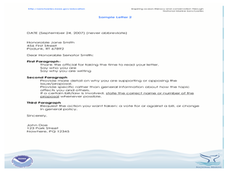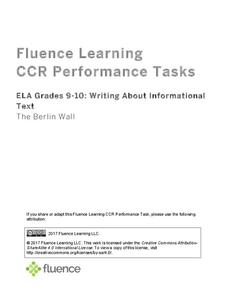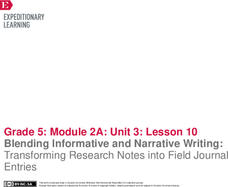Curated OER
Impersonating Great Poets Using "Science Verse" by Jon Scieszka
A great way to bring poetry and parody into your language arts classroom, this lesson mimics famous poems based on Jon Scieszka's Science Verse. The activity not only allows the class to see examples of poem parodies, but to create their...
Curated OER
Working in your Cubicle: Critical Thinking and Writing
Explore informative and explanatory writing with this lesson. Using a cube labeled with directives to describe, analyze, compare, associate, apply, and argue the topic, middle schoolers work individually or in groups to answer questions....
Massachusetts Institute of Technology
Sentence Structure of Technical Writing
Most teachers and scholars look for a way to simplify information. Informational how-to slides simplify the process of technical writing into a step-by-step process. Learners gather information on what to do, as well as what to avoid....
Curated OER
In My Opinion
Young writers craft letters to the government stating their opinion on different topics. They pick an environmental or ocean issue, research it, and craft their formal persuasive letter. Ensure your learners include supporting facts and...
Curated OER
Collage to Writing
Practice expository and creative writing with your class. Pupils use magazines to find pictures, cut them out, and create a collage. This work of art is then used as a writing prompt. They describe the collage in either a creative or...
Poetry4kids
How to Write a Silly Song Parody
Imitation is the sincerest form of flattery—and it's a great way to learn about poetic structure! Young poets use familiar tunes to write a song parody based on straightforward guidelines.
Curated OER
The "Write" Stuff: Strategies and Conventions for Imaginative Writing
Fifth graders develop and practice the steps involved in imaginative writing. They follow the steps/worksheets included and write imaginative stories of their own.
Curated OER
A "Sweet" Lesson in Economics
Students discover how to determine the flavor of a jellybean using different key documents. In this economics lesson, students discuss Virginia economics and begin an activity in which they will help decide on the what jellybean flavors...
Curated OER
Allowing Students to Explore Simple Physics and Marketing in English Class
Scientific method, linear measurements, friction, inertia. Imagine learning scientific vocabulary in an ELA class. Before researching and developing a presentation about simple machines, class members build a common, but decidedly...
Ahisma Summer Institute
The Power of One - Math in a Different Angle
In this 2-day lesson focused on exponents, middle schoolers will cross the curriculum by engaging in science, history and language arts activities. Exponential growth will be explored using grains of rice on a chess board. Exponential...
Curated OER
Unit 1: Water is Life: The Heart and Science Behind this Phrase
Water, water, everywhere — but will there be enough to drink? Check out these detailed lesson plans to meet NGSS water cycle and CCSS literacy standards in your science classroom. Learners do a close reading of a challenging, poetic text...
Curriculum Corner
Guest Teacher Plans (Grade 2)
Be prepared the next time you're in need of a substitute with a daily plan equipped with an assortment of activities covering subjects math, reading, word work, writing, and science.
Core Knowledge Foundation
Classification of Animals Tell It Again!™ Read-Aloud Anthology
Animal classification is the theme of a three-week read-aloud anthology. Scholars listen to and discuss a reading and complete extension activities throughout nine lessons. Writing opportunities delve deep into the process of writing an...
Curated OER
A Walk in the Tundra
Discuss the environment of the Arctic tundra using this resource. The focus of this lesson is the story A Walk in the Tundra by Rebecca L. Johnson. The appealing illustrations are bound to captivate your class! After reading the story,...
Fluence Learning
Writing a Narrative: How Bear Lost His Tail
After reading the first, second, and third parts of "How Bear Lost His Tail", third grade writers answer questions about the story by completing a series of options, including discussion points. Then, they begin to plan a new narrative...
Fluence Learning
Writing an Opinion: Student Council
A three-part assessment challenges scholars to write opinion essays covering the topic of the student council. After reading three passages, writers complete a chart, work with peers to complete a mini-research project, answer...
Fluence Learning
Writing Informational Text: Lemonade Stand
Use a performance task to assess third graders' ability to read informational text. After they plan a lemonade stand business, young entrepreneurs implement that plan through informational writing. The task assumes learners can...
Fluence Learning
Writing an Opinion: Is Pride Good or Bad?
Does pride really goeth before the fall, or can it be essential to one's development? Second graders read two of Aesop's fables that refer to pride in their morals, and write a short essay about whether pride is good or bad, based on...
Fluence Learning
Writing About Literature: Comparing and Contrasting Characters in Heidi
Scholars read excerpts from the story, Heidi, in a three-part assessment that focuses on comparing and contrasting characters. Each part contains three tasks that challenge learners to discuss, answer comprehension questions,...
Fluence Learning
Writing About Informational Text The Berlin Wall
On June 26, 1963 President John F. Kennedy delivered his famous "Ich bin ein Berliner" speech close to the Berlin Wall at the Rudolph Wilde Platz. On June 12, 1987 President Ronald Reagan Delivered his famous "Mr. Gorbachev, tear down...
Fluence Learning
Writing About Informational Text: The Dred Scott Decision
Looking for a performance assessment that asks individuals to demonstrate their competency in writing about informational text? Use Frederick Douglass' essay "On the Dred Scott Decision," and an excerpt from Abraham Lincoln's 1857 speech...
Fluence Learning
Writing About Literature: Nature in the Writings of John Muir and Emily Dickinson
As an assessment of their skill in crafting a compare and contrast essay, class members read and compare the portrayals of nature in excerpts from naturalist John Muir's My First Summer in the Sierra and from poet Emily Dickinson's "The...
EngageNY
Blending Informative and Narrative Writing: Transforming Research Notes into Field Journal Entries
The fabulous four. Scholars learn the four key components for creating an excellent journal entry. They then work to create a journal entry rubric and participate in a mini lesson about organizing and outlining journal entries.
EngageNY
How to Write Like a Scientist in the Field: Introduction to the Elements of Field Journals
It's time to start journaling. Scholars look at examples of science field journals. They work in pairs to examine and complete a note catcher about a field journal. They then add to an anchor chart by discussing the different features...

























